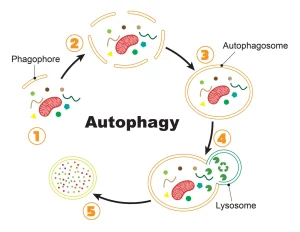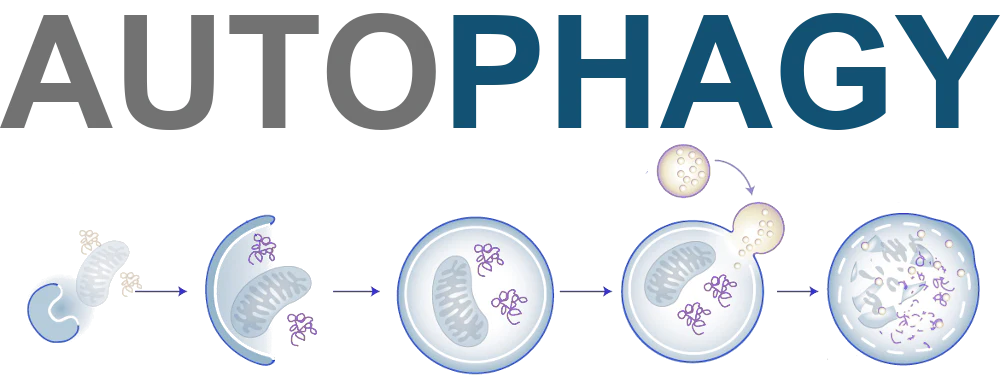Your Body’s Cellular Recycling Process
Updated on November 07, 2023
Autophagy is a natural process by which a cell breaks down old, damaged, unnecessary, or dysfunctional components within a cell and then repurposes those components for fuel and to build or maintain cells.

Autophagy is important as these “junk” components take up a lot of room in a cell and can prevent it from working properly. Autophagy also destroys disease-causing pathogens, like bacteria and viruses, that can harm cells.1
This article describes how autophagy works, what triggers the process, and the medical significance of autophagy in diseases like Parkinson’s disease and Crohn’s disease.
How Autophagy Works
Autophagy takes place within the gelatinous fluid inside of a cell called cytoplasm. It is a process in which a cell recycles unneeded or damaged parts of itself to create new parts and to provide energy for cell survival.

Autophagy occurs when cells are either damaged or deprived of the nutrients that they need to survive. When this happens, complex chemical reactions are triggered within the cytoplasm to turn “junk” into fuel and functional cell components.
The process involves four steps:
- Sequestration: This occurs when a dysfunctional component of a cell is surrounded by a double-membrane structure called a phagophore. The encased component is called an autophagosome.
- Transfer: This takes place when the autophagosome is fused to a specialized structure in the cytoplasm, called a lysosome. Lysosomes contain enzymes that degrade dysfunctional components.
- Degradation: This happens when a lysosome releases enzymes called hydrolases that break down the dysfunctional component into amino acids (the building block of proteins).
- Utilization: During this phase, amino acids are repurposed as a fuel source for cells, called adenosine triphosphate (ATP), and synthesized into new proteins to maintain cells, rebuild cells, or create new cells.
With autophagy, a cell effectively breaks itself down and rebuilds itself in order to survive. By doing so, a cell becomes more efficient.
Benefits of Autophagy
Autophagy has important effects that occur both within and outside of a cell.

Within the cell, autophagy can help:2
- Decrease oxidative stress (damage to cells caused by unstable molecules known as free radicals)
- Keep DNA and genes stable
- Avoid the premature deterioration and aging of cells
- Improve conversion of nutrients into energy
- Improve the elimination of waste
- Eliminate pathogens and other foreign materials within cells
- Help prevent tumor formation by eliminating toxic substances
Outside of the cell, autophagy can help:
- Decrease inflammation1
- Improve the transmission of nerve signals in the brain3
- Keep the immune system functioning normally4
Can You Trigger Autophagy?
Autophagy is typically triggered when a cell is starved of nutrition and goes into survival mode.5 This can happen with:

- Fasting: Depriving the body of nutrition forces cells to repurpose cell components into ATP for fuel.6
- Exercise: Exercise quickly burns glucose (the body’s main source of energy), triggering autophagy to keep cells functioning.7
- Restricting calories: Autophagy compensates for the loss of nutrients due to consuming too few calories.8
- Switching to a keto diet: Embarking on a high-fat, low-carb triggers autophagy when your body burns fat instead of glucose.
This doesn’t mean that you should try to induce autophagy to keep yourself healthier. The aim of autophagy ultimately is to keep the body in homeostasis.
Making sudden, severe changes to your diet or exercise routine can cause more harm than good. This is especially true if you are pregnant, breastfeeding, or managing a chronic condition like diabetes, heart disease, or high blood pressure.
Significance in Medicine
Autophagy declines with age, contributing to the aging process. Oxidative stress, DNA damage, ultraviolet radiation, and a person’s genetics can also disrupt autophagy, contributing to the development of certain chronic illnesses.

Studies have shown that autophagy dysfunction is associated with diseases like:9
- Amyotrophic lateral sclerosis (ALS)
- Alzheimer’s disease
- Autoimmune diseases, including Multiple sclerosis
- Cancer
- Chronic kidney disease
- Crohn’s disease
- Diabetes
- Heart disease
- Huntington’s disease
- Liver disease
- Parkinson’s disease
- Obesity
Even so, the relationship between autophagy and diseases like these isn’t clear-cut. While scientists are hoping to find ways to induce certain facets of autophagy to treat neurodegenerative diseases like Parkinson’s or even cancer, the research remains in its infancy.10
There is currently no evidence that you can alter or prevent disease by inducing autophagy, or that triggering autophagy is a reasonable health and wellness strategy.
Summary
Autophagy is a process that keeps your body’s cells in proper balance by taking old or damaged components in a cell and recycling them. The recycled parts are turned into amino acids that can be used for fuel or to form new proteins.

Autophagy is triggered when the body is starved of energy, such as can occur with exercise, calorie restriction, fasting, or a keto diet.
Certain chronic diseases are linked to problems with autophagy. Even so, there is no evidence that triggering autophagy with diet or exercise can prevent or treat illnesses. Exercise and diet may be of benefit to you, but not for the purpose of inducing autophagy.
By Kristin Hayes, RN
Kristin Hayes, RN, is a registered nurse specializing in ear, nose, and throat disorders for both adults and children.
The First New Anti-Parkinson’s Drug in 10 Years
Sources
Verywell Health uses only high-quality sources, including peer-reviewed studies, to support the facts within our articles. Read our editorial process to learn more about how we fact-check and keep our content accurate, reliable, and trustworthy.
- Pang Y, Wu L, Tang C, Wang H, Wei Y. Autophagy-inflammation interplay during infection: balancing pathogen clearance and host inflammation. Front Pharmacol. 2022;13:832750. doi:10.3389/fphar.2022.832750
- Yun HR, Jo YH, Kim J, Shin Y, Kim SS, Choi TG. Roles of autophagy in oxidative stress. Int J Mol Sci. 2020;21(9):3289. doi:10.3390/ijms21093289
- Kuijpers M, Kochlamazashvili G, Stumpf A, et al. Neuronal autophagy regulates presynaptic neurotransmission by controlling the axonal endoplasmic reticulum [published correction appears in Neuron. 2022 Feb 16;110(4):734]. Neuron. 2021;109(2):299-313.e9. doi:10.1016/j.neuron.2020.10.005
- Yin Z, Pascual C, Klionsky DJ. Autophagy: machinery and regulation. Microb Cell. 2016;3(12):588-596. doi:10.15698/mic2016.12.546
- Parzych KR, Klionsky DJ. An overview of autophagy: morphology, mechanism, and regulation. Antioxid Redox Signal. 2014;20(3):460-473. doi:10.1089/ars.2013.5371
- Pak M, Bozkurt S, Pınarbaşı A, Öz Arslan D, Aksungar FB. Effects of prolonged intermittent fasting model on energy metabolism and mitochondrial functions in neurons. Ann Neurosci. 2022;29(1):21-31. doi:10.1177/09727531211072303
- Møller AB, Voss TS, Vendelbo MH, Pedersen SB, Møller N, Jessen N. Insulin inhibits autophagy signaling independent of counterregulatory hormone levels but does not affect the effects of exercise. J Appl Physiol (1985). 2018;125(4):1204-1209. doi:10.1152/japplphysiol.00490.2018
- Shabkhizan R, Haiaty S, Moslehian MS, et al. The beneficial and adverse effects of autophagic response to caloric restriction and fasting. Adv Nutr. 2023;14(5):1211-1225. doi:10.1016/j.advnut.2023.07.006
- Ichimiya T, Yamakawa T, Hirano T, et al. Autophagy and autophagy-related diseases: a review. Int J Mol Sci. 2020;21(23):8974. Published 2020 Nov 26. doi:10.3390/ijms21238974
- Yang Y, Klionsky DJ. Autophagy and disease: unanswered questions. Cell Death Differ. 2020;27(3):858-871. doi:10.1038/s41418-019-0480-9
Additional Reading
- Jiang P, Mizushima N. Autophagy and human diseases. Cell Res. 2014;24(1):69-79. doi:10.1038/cr.2013.161
- Moloudizargari M, Asghari MH, Ghobadi E, Fallah M, Rasouli S, Abdollahi M. Autophagy, its mechanisms and regulation: Implications in neurodegenerative diseases. Ageing Res Rev. 2017;40:64-74. doi:10.1016/j.arr.2017.09.005









